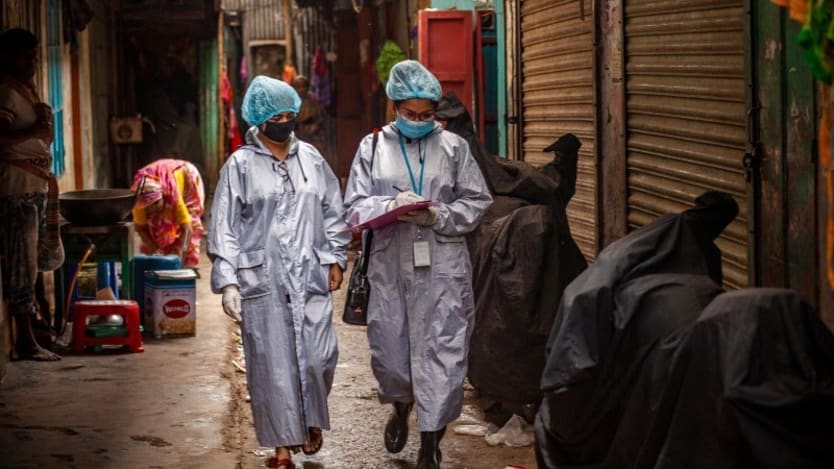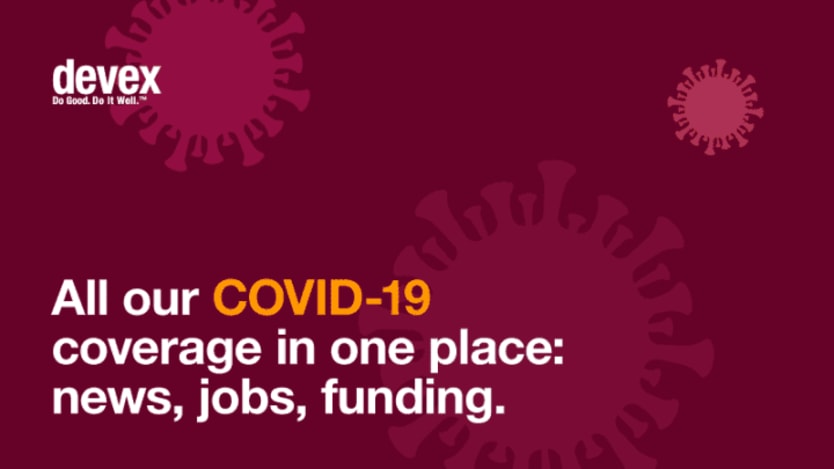
GLASGOW, Scotland — The financial impact of the coronavirus pandemic on the global development sector is deepening, according to a Devex survey, with more professionals reporting funding cuts and job losses.
The COVID-19 Trends Tracker:
► Independent consultants hit hard by job losses
► Local professionals step in to fill delivery gap amid questions over resources
► COVID-19's unequal impact on global development professionals
Half of the development professionals surveyed now say they have lost their job as a result of the pandemic or know someone who has, compared with 36% of professionals who said this when the Devex COVID-19 Trends Tracker survey was launched nine weeks ago.
Almost half of the respondents — 45% — also said that the organization they primarily work for has lost funding, an increase of 8 percentage points from week one of the survey.
The latest findings are based on insights gathered from more than 520 development workers in 98 countries from June 15-23.
No region has been immune to these funding cuts and job losses, although some are affected worse than others. In Asia, 62% of respondents said they or someone they know has lost their job, up from 42% in week one. In North America, 38% agreed with this statement, up from 21%.
With many programs on hold and some funding being reallocated for the COVID-19 response, organizations across the sector are working on tight budgets.
"Short-term consulting opportunities have dried up entirely.”
— A respondent to the Devex COVID-19 Trends Tracker surveyAlmost one-quarter of respondents said their operations had been halted completely, while 61% said their activities had been reduced because of the pandemic. Meanwhile, fundraising events have been canceled, donations from private individuals are believed to have dropped, and more than half of those surveyed — 51% — predicted that foreign aid will also fall as economies founder. Almost a third of respondents who work for a donor agency or government department said their employer had already lost funding.
Large-scale layoffs have also already happened. One respondent said they lost their job along with at least 28 colleagues, while Oxfam’s recent decision to close offices in 18 countries will result in more than 1,400 staffers being let go. Just over a quarter of the professionals surveyed were “very concerned” they may yet lose their job.
Long-term uncertainty
Independent consultants are among those who have been hit hardest by job losses. According to one respondent, “short-term consulting opportunities have dried up entirely.” Another said that many professionals involved in consultancy work were seeing projects reduced, postponed, or canceled, and that there was “uncertainty about the future.”
Travel restrictions and repatriation efforts have also left some global development professionals without a wage. With European Union tenders delayed, experts are at home and unable to “bill time,” one respondent said. Others noted cases of professionals choosing to end their contracts and travel home due to the risk of infection.
However, there is good news for some, as 14% of respondents said their employer has bucked the trend and gained funding — a figure that has remained relatively steady throughout the nine weeks of COVID-19 Trends Tracker surveys. This could mean more job opportunities at these organizations.
Some respondents have noted an increase in their workload as programming priorities change to align with the COVID-19 response. "In fact, there are more job demands in this pandemic in health development," one said, although there are also concerns around the additional demand on local staff. One contractor noted that while many of their deliverables were on hold, their contract had not yet been affected and they were hopeful there would be more opportunities for work as part of the COVID-19 response.
And among professionals who have been able to continue their work from home, some are even enjoying this arrangement. One respondent reported working in coordination with in-country experts and described the experience as “excellent.” The respondent hoped that home-based working would continue, even when restrictions are lifted, to save the “hassle with flights, hotels, taxis.” The respondent added, however, that many donors are not prepared for this “overdue paradigm shift” or for adapting to this new way of working.
Vince Chadwick contributed reporting to this story from Brussels.

Search for articles
Most Read
- 1
- 2
- 3
- 4
- 5








